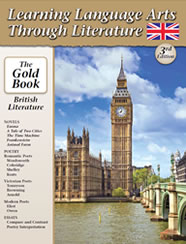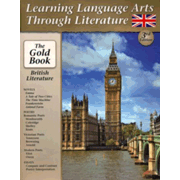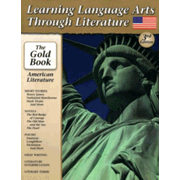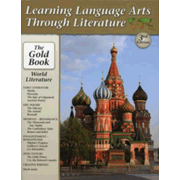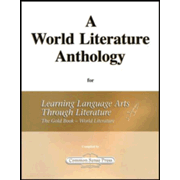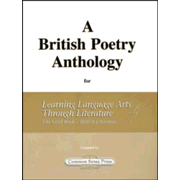The Learning Language Arts Through Literature: The Gold Books for high school are very different from the other Learning Language Arts Through Literature books for lower grade levels. There are four Gold Books: British Literature (by Greg Strayer and Timothy Nichols), American Literature (by Greg Strayer), World Literature (by Diane Welch), and Literary Criticism by (Erin Evans and Faith Welch). The first three course books are in their third editions, and the first edition of Literary Criticism was published in 2020 to complete the series.
All of the courses except American Literature require the use of an anthology published by Common Sense Press, and they all require additional literary works that you can borrow or purchase. Students read entire poems and books most of the time, although they sometimes read excerpts.
The first three books have a "Teacher Section" at the back with suggested answers, summaries of literary works, and other features that vary from book to book. These three courses also have an optional Course Notes and Test Booklet with course notes for each unit as well as unit tests and answer keys to assist parents and teachers with the evaluation of student work. Literary Criticism has only an answer key at the back. Common Sense Press also offers an Essay Assessment Service for all four courses.
The British, American, and World Literature courses may be used in whatever order you wish, although it usually works best to study the literature that correlates with the historical periods and places you are studying each year. Literary Criticism is intended for eleventh and twelfth graders. While the first three courses have much in common, Literary Criticism is different enough that I will describe it separately below. But first I will discuss the common elements of all four courses.
These courses each have 36 lessons and should take one school year to complete, using one lesson per week. The weekly lessons are presented in sections that are numbered one through five. These sections have detailed, daily lesson plans that are written for students to follow. The five sections are not set off distinctively in the first three course books, so it is easy to miss the numbering system. (Literary Criticism designates the sections clearly.) This is important to point out to students so that they understand what should be completed each day.
Most lessons include questions of some sort and/or writing assignments. You will use some of the questions for discussion and some for written work. While students can work independently through most of the course work, discussions will enhance the learning process. Once in a while, an assignment clearly states that students are to discuss something with their teacher. However, you will have to determine on your own whether to use other questions for discussion or oral responses. Writing assignments range from simple answers to essays, with significant attention given to essay writing.
Each book has a “How to Use This Book” page before the Table of Contents. The authors of American and British Literature recommend that students maintain a notebook for each course. I would recommend that students using World Literature and Literary Criticism also maintain a notebook. Students might complete some or all of their writing on the computer, but whether written by hand or on a computer, all student work should be compiled in their notebook.
These are excellent college preparatory courses. Free sample lessons are available on the publisher's website.
American, British, and World Literature Courses
Throughout these three courses, students study the elements of fiction and poetry and learn how to analyze the particular literary works that are being studied. All of this is done within the context of a Christian worldview.
These three Gold Book courses can serve as complete language arts courses for students who already have sufficient instruction in grammar and composition. Students are given composition assignments such as, "Write a three or four paragraph persuasive letter...." (World Literature, p. 175). The courses assume that the student already knows how to write compositions such as a persuasive letter. If not, students might need additional work on composition skills to be able to complete the assignments.
In American Literature, students read from Great American Short Stories, The Mentor Book of Major American Poets, The Red Badge of Courage, The Pearl, and The Old Man and the Sea. A Bible is also required.
British Literature requires A British Poetry Anthology (also published by Common Sense Press), along with Frankenstein, Emma, A Tale of Two Cities, The Time Machine, and Animal Farm.
World Literature ranges far and wide, with literary works from around the world and from different time periods. Students will read from A World Literature Anthology (from Common Sense Press); The Odyssey; No Fear Shakespeare: Romeo and Juliet; The Little Prince; and Cry, the Beloved Country. World Literature is substantially larger than the other books since it often includes additional brief, excerpted readings or poems within the lessons themselves.
Lessons in these books are arranged in units such as Early Literature, Epic Poetry, Medieval-Renaissance, Enlightenment-Romanticism, The Short Story, and 20th Century in World Literature. There are a number of lessons within each unit.
Parents or teachers need to check answers and evaluate essays and other written work. If possible, parents or teachers should also read the literature so they can discuss the literary works as well as any questions that might arise from the lessons. Summaries of the novels are included in the teacher sections in case the teacher doesn’t have time to read the novels, but this is unlikely to provide sufficient familiarity for in-depth discussions. The summaries along with suggested answers take up the last part (one-quarter to one-third) of each book. Note that summaries are not provided for all of the readings.
Literary Criticism Course
Literary Criticism prepares the student for college-level writing by shifting the emphasis toward writing about literature rather than studying various genres. Students will write twelve five-paragraph essays, three five-page essays, and one ten-page essay. The essays require research and citation of sources using Modern Language Association (MLA) style.
The first lesson begins by teaching essay-writing skills as students write their first five-paragraph essay over the first two weeks of the course. The next two weeks are devoted to writing a college application essay. Detailed instruction walks students through the writing process for both essays. After these first four weeks, essay writing is based upon the assigned literary works.
Students will read A Literary Criticism Anthology (published by Common Sense Press), Tuesdays with Morrie by Mitch Albom, Starship Troopers by Robert Heinlein, The Trial by Franz Kafka, No Fear Shakespeare: Macbeth by SparkNotes and William Shakespeare, and The Count of Monte Cristo by Alexandre Dumas. Additional poems, essays, and excerpts from other works are included within the course book.
Throughout the course, students are introduced to various types of literary criticism including reader response, biographical, historical, formalist, moralist, and narrative. In preparation for writing the ten-page essay, Lesson 32 directs students to research four more types of criticism: psychoanalytical, Marxist, post-structural, and feminist. Students will then choose one type of critical approach to use as they write a paper about The Count of Monte Cristo.
The course intends to stimulate students to think critically about ideas raised in the literature. While questions sometimes relate to beliefs and worldviews, the course does not directly advance a Christian worldview.
While students can work through this course independently, they will get the most out of it if they have a parent, teacher, or group of fellow students who also read the literary works and are prepared to discuss the questions and writing assignments. Also, the course requires a lot of writing, so having students discuss the questions for each lesson rather than writing out their answers will help to keep the workload manageable.





